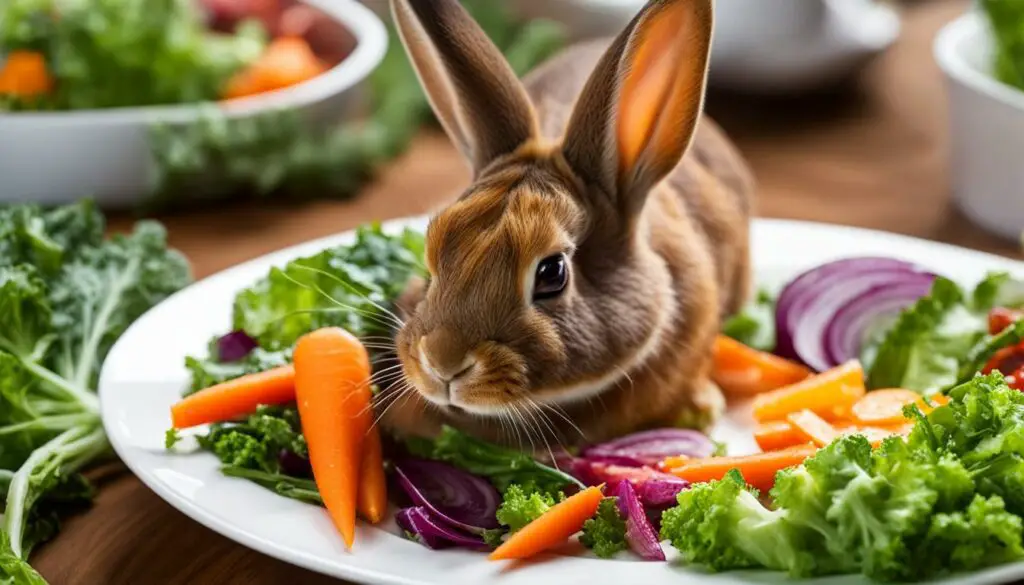Rabbits have a specific diet that consists mainly of hay and fresh greens. While vegetables are an important part of their diet, it’s important to know which ones are suitable for your fluffy friend. In this guide, I will provide you with a comprehensive overview of whether rabbits can eat spring mix and its role in a rabbit’s nutrition. The information is sourced from various reputable rabbit care sources.
Key Takeaways:
- Spring mix can be fed to rabbits, but in moderation and considering specific ingredients.
- Leafy greens and a variety of vegetables should make up the majority of a rabbit’s diet.
- Hay is an essential component of a rabbit’s diet and should be provided at all times.
- Regular veterinary care and a safe environment are crucial for a rabbit’s well-being.
- Monitoring your rabbit’s digestion and adjusting their diet accordingly is important.
Understanding the Rabbit Diet
The rabbit diet plays a crucial role in their overall health and well-being. As rabbit owners, it’s important to understand the nutritional needs of our furry friends to ensure they thrive. A balanced rabbit diet consists of approximately 15-20% vegetables, with the majority being leafy greens such as lettuce, parsley, and cilantro. These greens provide essential vitamins and minerals necessary for a rabbit’s health.
To maintain their nutritional balance, rabbits should be fed around 2 cups of vegetables per 6lbs of body weight, split into two feedings. This ensures that they receive the necessary nutrients without overeating. However, it’s important to note that not all vegetables are suitable for rabbits. Some vegetables should be fed in moderation or avoided altogether due to their nutrient content. This ensures that rabbits receive the right balance of nutrients and prevents any potential digestive issues.
In addition to vegetables, a large portion of a rabbit’s diet should consist of hay. Hay is essential for maintaining good dental health and proper digestion. It should make up the majority of their food intake and be available to them at all times. Grass hay, such as timothy, orchard, oat hay, and brome, provide essential nutrients like Vitamin A, Vitamin D, calcium, and protein. It’s important to provide a variety of grass hays to ensure a well-rounded diet for your rabbit.
Suitable Vegetables for Rabbits
When it comes to choosing vegetables for rabbits, it’s important to select those that are safe and suitable for their diet. While there is some debate within the rabbit community, certain vegetables have been deemed rabbit-friendly and can be included in their feeding routine. These vegetables provide essential nutrients and variety to your rabbit’s diet, ensuring their overall health and well-being.
Leafy Greens
Leafy greens are a staple in a rabbit’s diet and should make up a significant portion of their vegetable intake. These greens are rich in vitamins and minerals, promoting good digestion and overall vitality. Some safe leafy greens for rabbits include:
- Arugula
- Romaine lettuce
- Boston lettuce
- Kale (in moderation)
Offer a variety of leafy greens to provide a well-rounded nutritional profile for your rabbit.
Other Suitable Vegetables
In addition to leafy greens, there are other vegetables that rabbits can enjoy in moderation. These vegetables provide added variety and flavor to their diet. Some safe options include:
- Cucumbers
- Carrots (in limited quantities)
- Bell peppers
- Zucchini
These vegetables can be given as occasional treats or rotated into their feeding routine to keep things interesting for your furry friend.
Important Considerations
While the vegetables mentioned above are generally safe for rabbits, it’s essential to consider your rabbit’s individual sensitivities and preferences. Some rabbits may have specific dietary restrictions or intolerances, so it’s important to introduce new vegetables gradually and observe their reactions. Additionally, always wash vegetables thoroughly before feeding them to your rabbit to remove any pesticides or other contaminants.
| Recommended Vegetables for Rabbits | Suitable in Moderation |
|---|---|
| Arugula | Kale |
| Romaine lettuce | Cucumbers |
| Boston lettuce | Carrots |
| Bell peppers | |
| Zucchini |
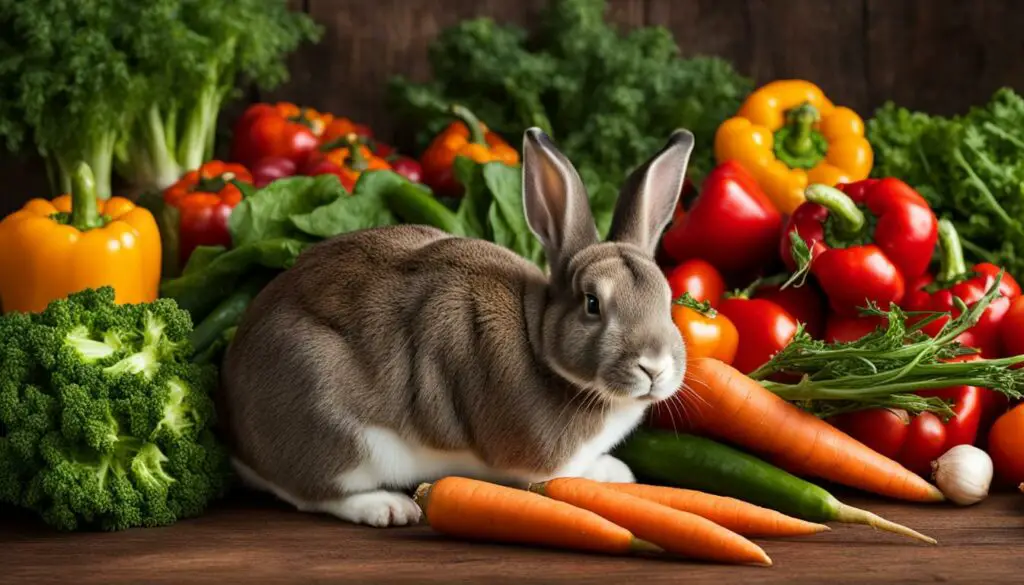
“A well-balanced and varied diet is essential for the health and happiness of rabbits. Including suitable vegetables, such as leafy greens and other rabbit-friendly options, ensures that they receive the necessary nutrients for optimal well-being.”
Vegetables to Feed in Moderation
While rabbits can enjoy a variety of vegetables in their diet, some should be fed in limited quantities. These vegetables include kale, carrot tops, Swiss chard, and dandelion greens. Although these vegetables are nutritious, they are also richer and can cause soft stools if consumed in excess. To ensure your rabbit’s digestive health, it’s recommended to offer these vegetables once or twice a week or as special treats. Monitoring your rabbit’s digestion and adjusting their vegetable intake accordingly will help maintain their overall well-being.
Vegetables to Feed in Moderation:
| Vegetable | Frequency |
|---|---|
| Kale | Once or twice a week |
| Carrot tops | Once or twice a week |
| Swiss chard | Once or twice a week |
| Dandelion greens | Once or twice a week |
By providing these vegetables in moderation, you can ensure that your rabbit receives a balanced diet without compromising their digestion. Remember to always observe your rabbit’s health and adjust their vegetable intake as needed.
Bunny-Approved Vegetables
When it comes to providing a safe and nutritious diet for your rabbit, it’s essential to include a variety of vegetables. Here are some bunny-approved vegetables that you can confidently include in your furry friend’s meal plan:
- Kale: Packed with vitamins A, C, and K, kale is a nutritious leafy green that rabbits enjoy.
- Romaine Lettuce: This crispy lettuce provides hydration and fiber for your rabbit’s digestive health.
- Carrots: Carrots are a rabbit favorite, but they should be given in moderation due to their sugar content.
- Cilantro: This herb adds a fresh flavor to your rabbit’s diet and is a good source of antioxidants.
- Basil: Another fragrant herb that rabbits love, basil offers a variety of nutrients and can be fed in moderation.
- Bok Choy: This leafy green provides a good source of vitamins and minerals and can be offered to rabbits in small quantities.
- Cucumber: Cucumber is a hydrating vegetable that rabbits enjoy, but it should be given sparingly as a treat.
Remember to introduce new vegetables gradually to your rabbit’s diet and observe their reaction. Every rabbit has individual preferences and sensitivities, so it’s important to pay attention to their likes and dislikes. Providing a balanced and varied selection of bunny-approved vegetables will contribute to your rabbit’s overall health and well-being.
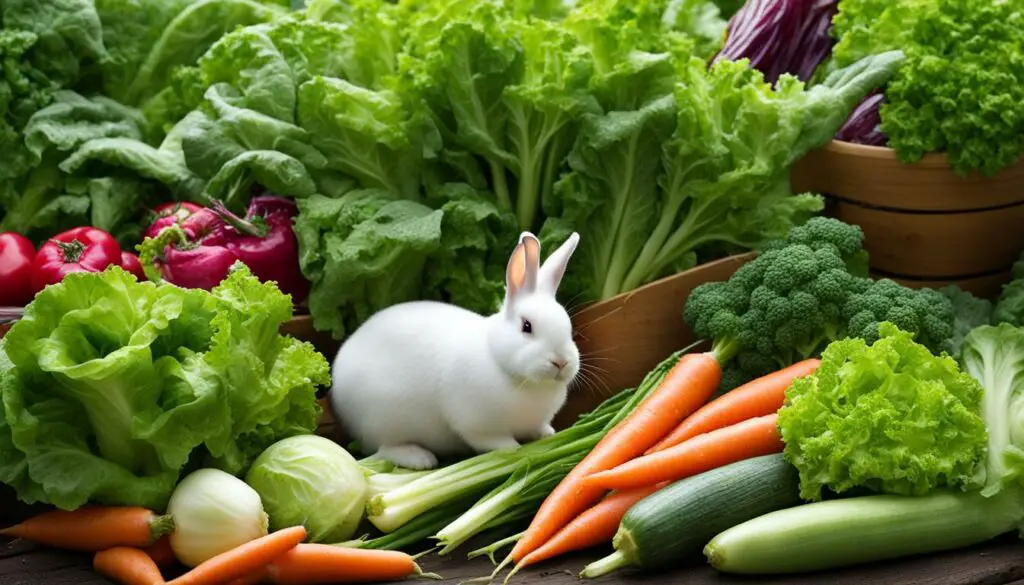
Vegetables to Limit
While most vegetables are safe for rabbits, there are a few that should be limited or avoided. Foods in the onion family, such as onions, garlic, leeks, and chives, should not be fed to rabbits as they can cause blood abnormalities. It’s crucial to prioritize your rabbit’s health and avoid feeding them these high-starch vegetables. Along with onions, garlic, leeks, and chives, corn should also be avoided as it can cause bowel obstruction in rabbits.
Avoid feeding your rabbit processed foods like chocolate, cookies, crackers, bread, cake, muffins, chips, popcorn, yogurt, honey, pasta, and candy. These items are not suitable for their digestive system and can lead to various health issues. Additionally, it’s important to prevent your rabbit from snacking from dog or cat food bowls or consuming bird seed or meat as part of their diet.
Feeding your rabbit a healthy and balanced diet is crucial for their overall well-being. By avoiding high-starch vegetables, processed foods, and inappropriate snacks, you can help ensure your rabbit’s digestive health and prevent any potential health issues.
| Vegetables to Limit | Reason |
|---|---|
| Onions, garlic, leeks, and chives | Can cause blood abnormalities in rabbits |
| Corn | Can cause bowel obstruction |
Providing your rabbit with a balanced diet that consists of suitable vegetables and hay is essential for their overall health. It’s always recommended to consult with a rabbit-savvy veterinarian or expert to get specific dietary advice and ensure you are meeting your rabbit’s nutritional needs.
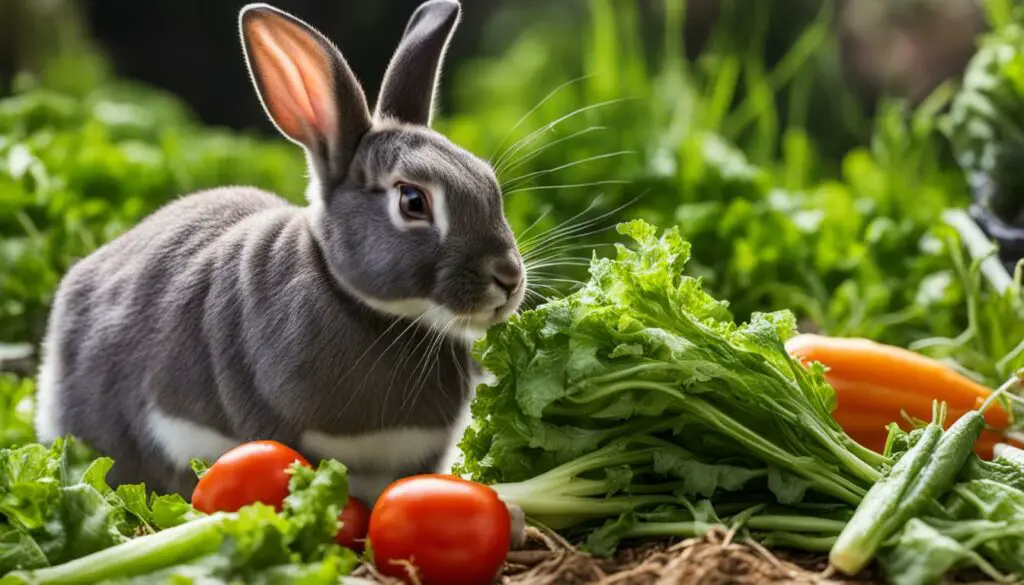
Importance of Hay in a Rabbit’s Diet
When it comes to a rabbit’s diet, hay plays a crucial role in providing them with essential nutrients and promoting overall health. Hay should make up the majority of a rabbit’s food intake and be available to them at all times. Grass hay, such as timothy, orchard, oat hay, and brome, is particularly beneficial for rabbits.
Hay is rich in essential nutrients like Vitamin A, Vitamin D, calcium, and protein. It provides the necessary fiber that aids in healthy digestion and prevents gastrointestinal issues. Additionally, hay promotes proper tooth wear, as rabbits have continuously growing teeth that require constant grinding to stay in good condition.
| Benefits of Hay in a Rabbit’s Diet |
|---|
| Ensures a balanced diet by providing crucial nutrients |
| Promotes healthy digestion and prevents gastrointestinal issues |
| Aids in proper tooth wear |
| Helps prevent obesity by providing a low-calorie option |
| Keeps rabbits mentally stimulated and prevents boredom |
Hay should be a staple in a rabbit’s diet, and its importance cannot be overstated. It serves as the foundation for a well-rounded and nutritionally balanced rabbit diet and contributes to their overall well-being.
It’s recommended to provide a variety of grass hays to ensure a diverse range of nutrients and to prevent rabbits from getting bored with their diet. Remember to always provide fresh, clean hay and monitor your rabbit’s hay consumption to ensure they are getting enough.
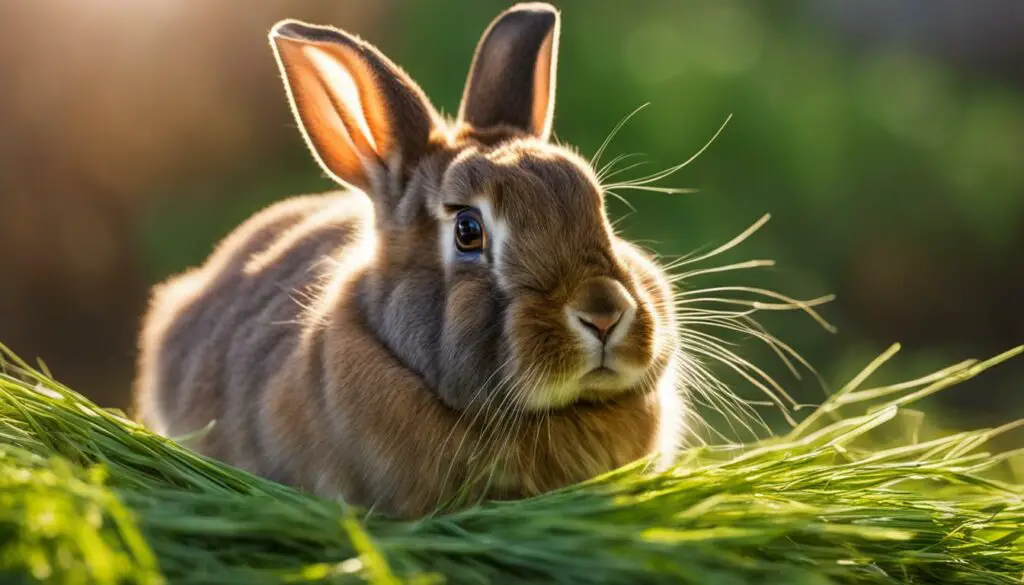
Fresh Foods for Rabbits
When it comes to providing a well-rounded diet for your rabbit, incorporating fresh foods is essential. Fresh foods offer a variety of nutrients, flavors, and textures that can enhance your rabbit’s feeding experience. As part of their diet, fresh foods should primarily consist of leafy greens, which should make up around 75% of the fresh portion. Additionally, non-leafy vegetables can be included in smaller amounts, comprising about 15% of their diet. Fruits, while tasty, should be limited to about 10% of their diet and considered as occasional treats.
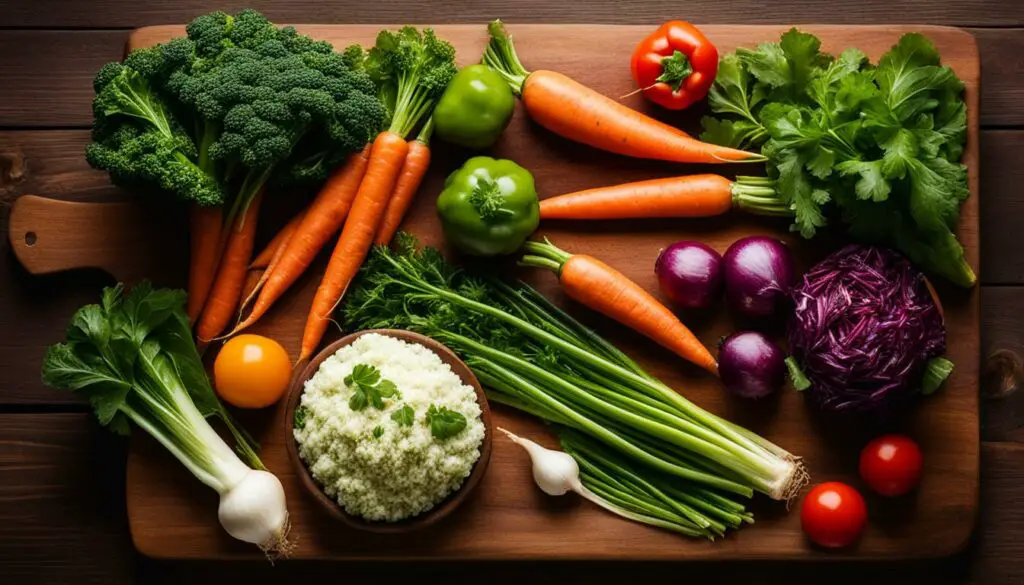
Providing your rabbit with a diverse selection of fresh foods ensures that they receive a wide range of essential nutrients. Leafy greens such as kale, romaine lettuce, collard greens, and parsley are excellent choices for rabbits. These greens are packed with vitamins and minerals that contribute to overall rabbit health. It’s important to wash all fresh foods thoroughly before offering them to your rabbit, as this helps remove any potential pesticides or contaminants.
When introducing fresh foods into your rabbit’s diet, it’s crucial to do so gradually. Start by offering small portions and carefully observe your rabbit’s digestion and overall wellbeing. It’s normal for rabbits to have softer stools when first introduced to fresh foods, but if you notice any severe changes in their digestive health, it’s recommended to consult with a veterinarian.
Remember, fresh foods should never replace a rabbit’s primary diet of hay, which should make up the majority of their food intake. By providing a balanced combination of fresh foods, hay, and occasional treats, you can ensure your rabbit receives a nutritionally complete diet that supports their overall health and wellbeing.
Recommended Leafy Greens for Rabbits
Leafy greens are an important part of a rabbit’s diet as they provide essential nutrients and contribute to their overall health. Here is a list of recommended leafy greens that are safe for rabbits and can be included in their nutrition:
- Kale
- Romaine lettuce
- Arugula
- Swiss chard
- Bok choy
- Endive
- Cilantro
These leafy greens are rich in vitamins and minerals and can be offered to rabbits on a regular basis. It’s important to introduce new greens gradually to avoid any digestive upsets, and monitor your rabbit’s reaction to ensure they tolerate them well.
Remember to wash all leafy greens thoroughly before feeding them to your rabbit to remove any potential pesticides or dirt. Providing a variety of leafy greens in your rabbit’s diet will not only ensure nutritional diversity but also add interest and enrichment to their feeding routine.
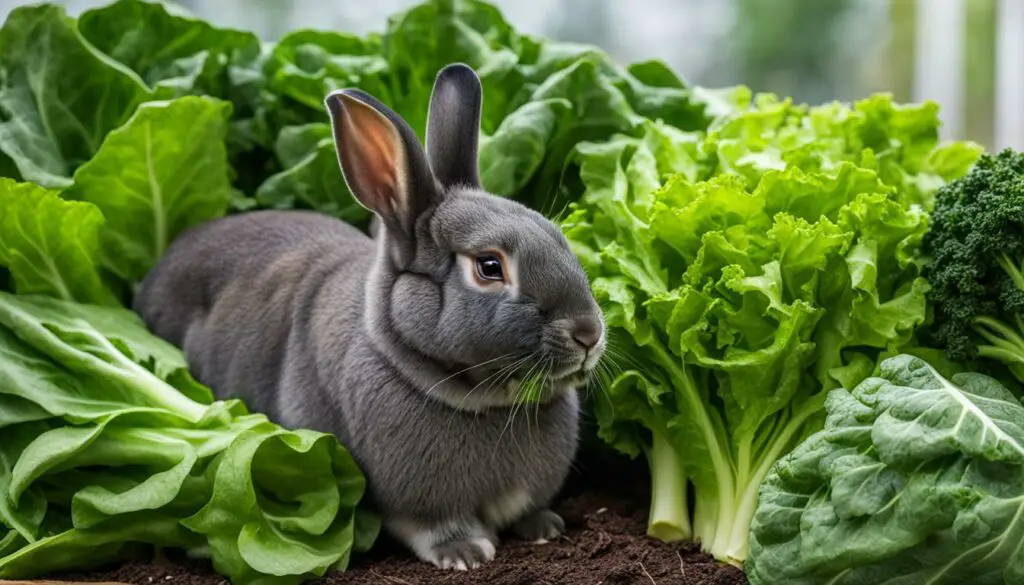
Table: Nutritional Comparison of Recommended Leafy Greens for Rabbits
| Greens | Vitamin A (IU per 100g) | Vitamin C (mg per 100g) | Calcium (mg per 100g) | Phosphorus (mg per 100g) |
|---|---|---|---|---|
| Kale | 9,990 | 120 | 150 | 92 |
| Romaine Lettuce | 2,450 | 8 | 33 | 23 |
| Arugula | 1,480 | 15 | 160 | 52 |
| Swiss Chard | 6,800 | 30 | 51 | 46 |
| Bok Choy | 2,500 | 28 | 105 | 20 |
| Endive | 2,600 | 6 | 52 | 34 |
| Cilantro | 7,624 | 27 | 74 | 48 |
It’s important to note that while leafy greens provide essential nutrients, they should be part of a balanced diet that includes hay, fresh water, and appropriate vegetables. Consult with a rabbit-savvy veterinarian for personalized dietary recommendations for your furry friend.
Non-Leafy Vegetables for Rabbits
While leafy greens are a crucial part of a rabbit’s diet, there are also non-leafy vegetables that can be included in their meals. These vegetables provide additional nutrients and variety to their diet. However, it’s important to remember that non-leafy vegetables should be given in limited quantities to ensure a balanced diet for your rabbit.
One recommended non-leafy vegetable for rabbits is bell peppers. Bell peppers are low in calories and high in Vitamin C, making them a healthy addition to your rabbit’s meals. They come in vibrant colors that add visual appeal to the plate as well. Another suitable option is cucumber, which is refreshing and hydrating for rabbits. Just make sure to remove the seeds before serving.
Carrots are often associated with rabbits, and they can indeed be included in their diet. However, carrots should be given in moderation due to their high sugar content. A small slice of carrot as an occasional treat can be enjoyed by your furry friend. Other non-leafy vegetables that can be fed to rabbits include radishes, celery, and green beans. Remember to introduce these vegetables gradually to monitor your rabbit’s digestion and prevent any potential tummy troubles.
| Vegetable | Benefits |
|---|---|
| Bell Peppers | Low in calories, high in Vitamin C |
| Cucumber | Hydrating and refreshing |
| Carrots | Occasional treat, high in sugar |
| Radishes | Crunchy and low in calories |
| Celery | Crisp and fibrous |
| Green Beans | Low in calories and rich in nutrients |
Remember to always wash the non-leafy vegetables thoroughly before offering them to your rabbit. Remove any seeds, pits, or stems that may be harmful. It’s also essential to introduce new vegetables gradually and monitor your rabbit’s response. If you notice any digestive issues or changes in behavior, consult with a veterinarian for guidance.
Fruits for Rabbits in Moderation
When it comes to feeding fruits to rabbits, it’s important to remember that they should be given in moderation. While fruits can be a delicious treat for your furry friend, they should not make up a large portion of their diet. Fruits are high in sugar and can cause digestive issues if consumed in excess. It’s crucial to provide a balanced diet that consists primarily of hay and fresh vegetables, with fruits as an occasional treat.
Some safe fruits that can be given to rabbits in limited amounts include:
- Apples
- Bananas
- Blueberries
- Strawberries
- Melons (such as watermelon)
When offering fruits to your rabbit, it’s important to remove any seeds or pits as they can be a choking hazard. Additionally, it’s recommended to introduce new fruits gradually to observe how your rabbit reacts to them. If you notice any digestive issues or changes in behavior, it’s best to consult with a veterinarian.
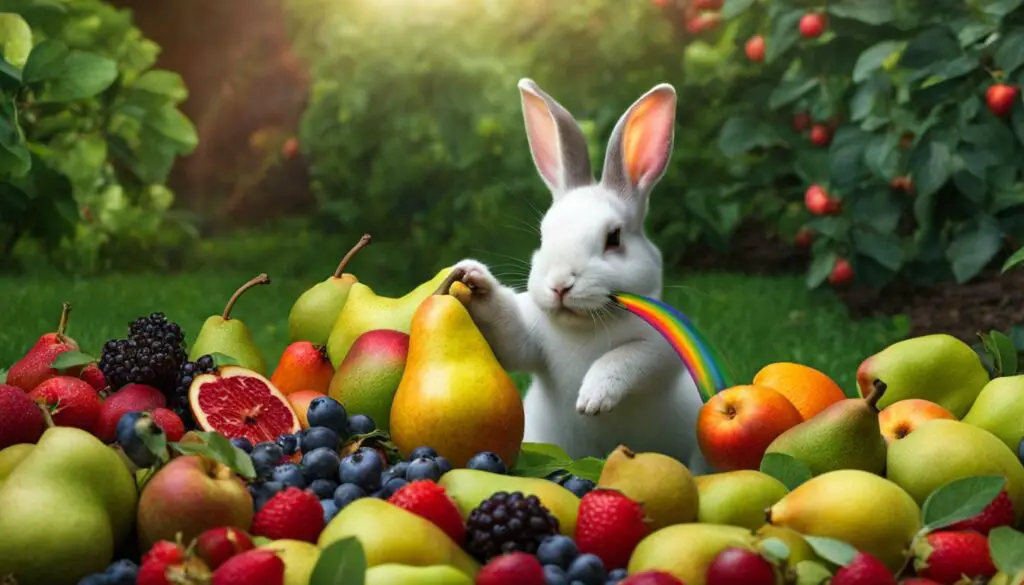
Tasty Rabbit Treats
While fruits can be a tasty treat for rabbits, it’s important to remember that they should only be given in small quantities. Providing a varied and balanced diet that includes hay, fresh vegetables, and limited amounts of fruit is essential for your rabbit’s overall health and well-being. Always consult with a veterinarian if you have any concerns or questions about your rabbit’s diet or specific fruit choices.
Considerations for Rabbits and Spring Mix
When it comes to feeding rabbits, it’s important to consider the specific ingredients in their diet. While rabbits can eat spring mix, it should be fed in moderation and with caution. Spring mix is a combination of various leafy greens, often including lettuce, spinach, and other vegetables. While some of these ingredients are safe for rabbits, others should be avoided or fed in limited quantities.
One ingredient commonly found in spring mix is spinach. While spinach can be a nutritious addition to a rabbit’s diet, it should be fed in moderation due to its high calcium content. Excessive calcium intake can contribute to bladder issues in rabbits, so it’s important to monitor their consumption of spinach and other calcium-rich foods.
Additionally, some spring mix varieties may contain vegetables like broccoli or cabbage. While these vegetables can be part of a rabbit’s diet, they should be fed in limited quantities. Broccoli and cabbage are higher in starch, which can affect digestion in rabbits. It’s best to offer these vegetables as occasional treats rather than as a regular part of their diet.
Rabbits and Spring Mix: Key Considerations
- Feed spring mix in moderation
- Monitor spinach intake due to high calcium content
- Avoid spring mix with broccoli or cabbage
Remember, every rabbit is unique, and their dietary needs may vary. It’s important to observe your rabbit’s digestion and behavior when introducing new foods, including spring mix. If you notice any adverse reactions or changes in their health, it’s best to consult with a rabbit-savvy veterinarian for guidance.
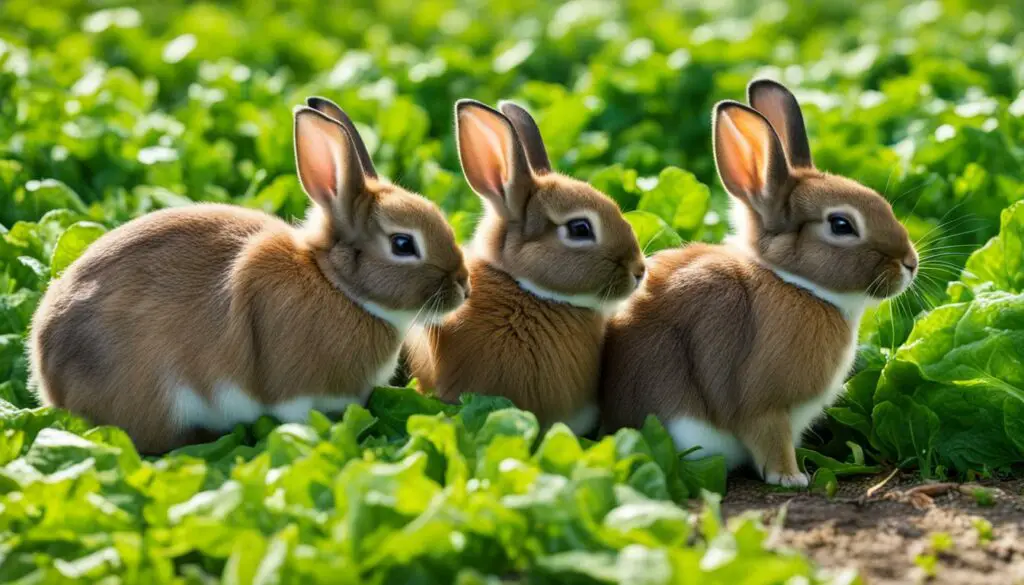
Tips for Feeding Rabbits a Balanced Diet
Feeding rabbits a balanced diet is crucial for their overall health and well-being. Here are some important tips to help you provide your furry friend with a nutritionally balanced diet:
- Hay is the main staple of a rabbit’s diet. Make sure to provide unlimited access to fresh, high-quality hay, such as timothy, orchard, oat, or brome hay. Hay provides essential nutrients, promotes healthy digestion, and helps wear down their teeth.
- Leafy greens should make up a significant portion of your rabbit’s diet. Offer a variety of safe leafy greens, such as romaine lettuce, kale, and parsley. These greens provide additional vitamins and minerals while adding variety to their meals.
- Introduce vegetables gradually to your rabbit’s diet to avoid digestive upset. Start with small amounts of rabbit-safe vegetables like carrots, bell peppers, and cucumbers. Monitor your rabbit’s response and adjust the portions accordingly.
- Fruits should be given as occasional treats due to their high sugar content. Offer small amounts of rabbit-safe fruits like apples, strawberries, and blueberries. Remember to remove any seeds or pits before feeding.
- Avoid feeding your rabbit foods that are toxic to them, such as chocolate, onions, garlic, and mushrooms. These can be dangerous and harmful to their health.
- Water is essential for your rabbit’s hydration. Make sure your rabbit has access to fresh, clean water at all times. Consider using a gravity-fed water dispenser to ensure a steady supply.
Remember to consult with a rabbit-savvy veterinarian for expert advice on your rabbit’s specific dietary needs. They can provide tailored recommendations based on your rabbit’s age, weight, and overall health. By following these tips and providing a balanced diet, you can help ensure a long and healthy life for your beloved bunny.
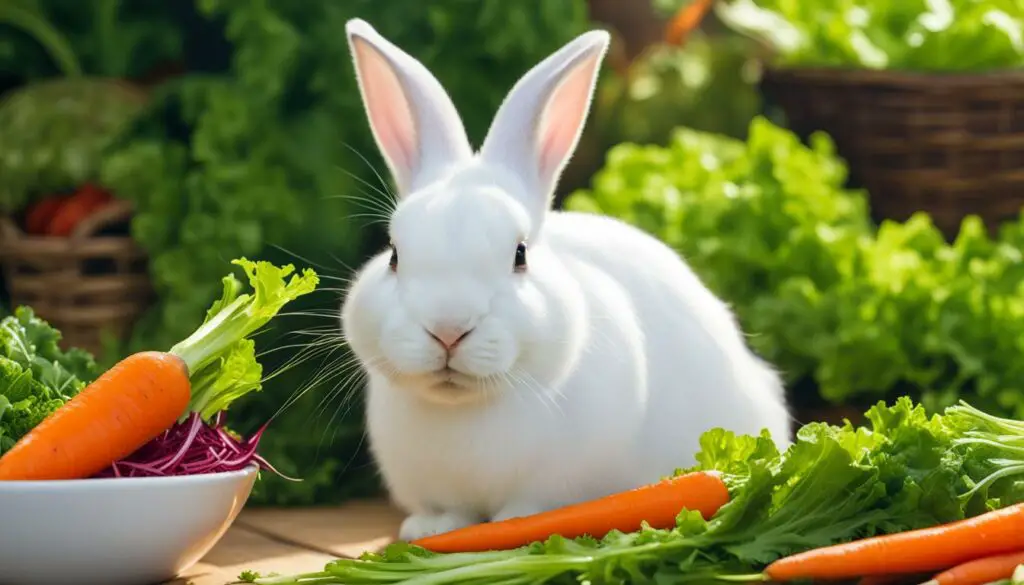
The Importance of Veterinary Care for Rabbits
As a responsible rabbit owner, it is vital to prioritize the health and well-being of your furry friend. Regular veterinary care plays a crucial role in ensuring that your rabbit remains healthy and free from potential health issues. By scheduling routine check-ups with a veterinarian who specializes in rabbit care, you can stay ahead of any potential problems and address them promptly.
Veterinary check-ups allow for early detection of any underlying health conditions that may not be immediately apparent. Rabbits are masters at hiding signs of illness, so it is important to have a professional examine them regularly. A knowledgeable veterinarian will be able to identify any subtle changes in behavior, appetite, or physical condition that may indicate a health concern.
In addition to regular check-ups, vaccinations are an essential aspect of rabbit health care. Vaccinating your rabbit against diseases such as Viral Hemorrhagic Disease (VHD) and myxomatosis can help protect them from potentially fatal illnesses. Consult with a veterinarian to ensure that your rabbit’s vaccination schedule is up to date and appropriate for their specific needs.
Remember, prevention is always better than cure when it comes to your rabbit’s health. By providing regular veterinary care, including check-ups and vaccinations, you are taking proactive steps to safeguard your rabbit’s overall well-being. Your veterinarian can also provide guidance on nutrition, dental care, and other aspects of rabbit health to ensure that your furry friend enjoys a long, happy, and healthy life.
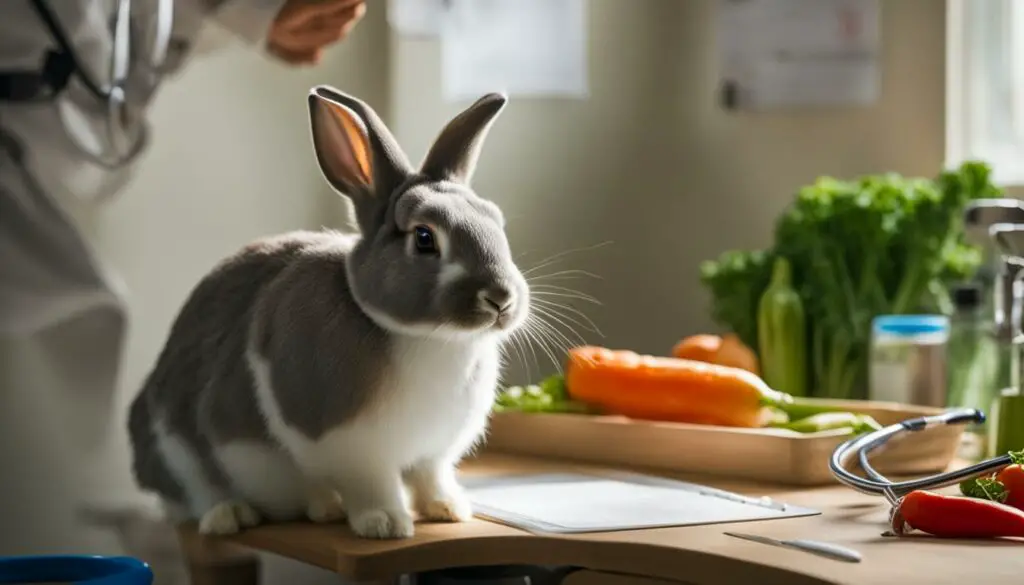
Creating a Safe Environment for Your Rabbit
As a responsible rabbit owner, it is important to create a safe and rabbit-friendly environment for your furry friend. By taking a few simple steps, you can ensure that your rabbit stays happy and healthy in their surroundings.
One of the first considerations is rabbit-proofing your home. Rabbits are curious creatures and love to explore, so it is essential to remove any potential hazards. Keep electrical cords out of reach or use cord protectors to prevent your rabbit from chewing on them. Similarly, ensure that any houseplants or flowers within your rabbit’s reach are non-toxic, as some plants can be harmful if ingested.
Another important aspect of a rabbit-safe environment is providing a spacious and enriching living space. Your rabbit should have plenty of room to hop, run, and explore. Offer appropriate toys and chew items to keep them mentally stimulated and prevent boredom. Additionally, provide hiding spots and tunnels for your rabbit to retreat to when they want some privacy or a sense of security.
| Rabbit-Proofing Checklist |
|---|
| Avoid letting your rabbit roam unsupervised in areas where pesticides or cleaning chemicals have been used. |
| Secure any loose wires or cords that may be within your rabbit’s reach. |
| Remove or protect any toxic plants that your rabbit could potentially nibble on. |
| Ensure that your rabbit’s living space is escape-proof and free from any potential hazards. |
| Provide a variety of toys, tunnels, and chew items to keep your rabbit mentally stimulated. |
Regular observations of your rabbit’s behavior are also crucial in maintaining a safe environment. Pay attention to any signs of distress, such as excessive chewing or changes in appetite or behavior. If you notice anything out of the ordinary, it is important to consult with a rabbit-savvy veterinarian.
By following these tips and creating a safe environment, you can ensure that your rabbit thrives in their surroundings and enjoys a happy and healthy life.
Conclusion
In conclusion, when it comes to spring mix, rabbits can eat it, but it should be fed in moderation and with caution. While some ingredients in spring mix, like lettuce and certain leafy greens, are suitable for rabbits, others, such as spinach, broccoli, and cabbage, should be avoided or fed sparingly. It’s important to prioritize the overall balance of a rabbit’s diet, which should primarily consist of hay, fresh leafy greens, and a variety of vegetables.
By providing a well-rounded and nutritionally balanced diet, you can ensure your rabbit’s health and well-being. It’s also important to remember that each rabbit is unique, and their dietary needs may vary. Monitoring your rabbit’s digestion, observing their preferences and sensitivities, and consulting with a knowledgeable veterinarian will help you create a diet plan tailored specifically to your fluffy friend.
Alongside a proper diet, regular veterinary care, including check-ups and vaccinations, is crucial for your rabbit’s overall health. Additionally, creating a safe and enriching environment, free from potential hazards and toxic substances, is essential. By following these guidelines and providing the necessary care, you can ensure that your rabbit lives a happy, healthy, and fulfilling life as your beloved companion.
FAQ
Can rabbits eat spring mix?
Yes, rabbits can eat spring mix, but it should be fed in moderation and with consideration for the specific ingredients in the mix.
What should a rabbit’s diet consist of?
A rabbit’s diet should consist mainly of hay, with approximately 15-20% vegetables and a small portion of fresh foods and fruits.
Which vegetables are suitable for rabbits?
Leafy greens such as lettuce, parsley, and cilantro are suitable for daily feeding, along with certain vegetables like spinach, broccoli, cabbage, brussel sprouts, bell peppers, and zucchini in rotation or small amounts.
Are there vegetables that should be fed in moderation?
Yes, vegetables like kale, carrot tops, Swiss chard, and dandelion greens should be fed in limited quantities to avoid digestive issues.
What are some recommended leafy greens for rabbits?
Recommended leafy greens for rabbits include romaine lettuce, green leaf lettuce, red leaf lettuce, and arugula.
Can rabbits eat non-leafy vegetables?
Yes, non-leafy vegetables like carrots, celery, and bell peppers can be included in a rabbit’s diet in small amounts.
Can rabbits eat fruits?
Yes, fruits can be given to rabbits in limited amounts as occasional treats. Recommended fruits for rabbits include apples, strawberries, and blueberries.
Is spring mix safe for rabbits?
Spring mix is safe for rabbits, but it should be fed in limited quantities and with consideration for the specific ingredients in the mix.
How can I ensure my rabbit’s diet is balanced?
You can ensure your rabbit’s diet is balanced by providing a variety of vegetables, offering hay at all times, and limiting fruits to about 10% of their diet.
Why is hay important in a rabbit’s diet?
Hay is important in a rabbit’s diet because it provides essential nutrients, promotes healthy teeth, and helps maintain proper gastrointestinal tract function.
How can I create a rabbit-friendly home?
You can create a rabbit-friendly home by removing toxic plants, keeping harmful items out of reach, and providing a spacious and enriching living space for your rabbit.
What should I consider for my rabbit’s veterinary care?
It’s important to prioritize your rabbit’s health by scheduling regular check-ups with a rabbit-savvy vet and ensuring that their vaccinations are up to date.
What is the conclusion about rabbits and spring mix?
While rabbits can eat spring mix, it should be fed in moderation and with consideration for the specific ingredients. Leafy greens and a variety of vegetables should make up the majority of a rabbit’s diet.
What are some tips for feeding rabbits a balanced diet?
Some tips for feeding rabbits a balanced diet include monitoring their vegetable intake, providing a variety of hay and fresh foods, and adjusting their diet based on their individual needs.

